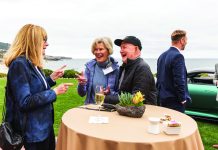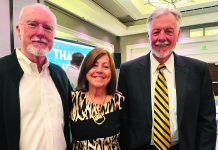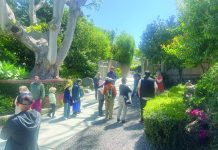Heeding the Call

“My grandfather fought in Turkey to regain Armenian lands. He was lucky to get out of that battle alive and get back to America. Telling the story years later he handed me his gun and sword and declared, ‘You will get the call to defend Armenia.’ ”
Laguna Beach eye surgeon Roger Ohanesian recounted this childhood mandate as we drove through the streets of Yerevan on our first day in Armenia. “What do I do with this gun and sword?” Ohanesian had wondered. But it turned out that the call was the important thing, and the tools to answering the call were very different, tools of peace and generosity rather than of war.
In 1991, with the dissolving of the Soviet Union, Armenia was not only faced with an economic near-collapse as its Soviet-dependent factories closed nationwide, but also with war with its neighbor to the east, Azerbaijan. Oil supplies were cut off and the nation was subsisting on one to two hours of electricity per day. Over the doctor’s office fax came an emergency request by the Armenian minister of health for international medical assistance in a threatening humanitarian crisis. Ohanesian answered the call. Struck by the tremendous need, he plunged into what he calls his second full-time job: organizing doctors, an administrative structure and fundraising to provide state-of-the art eye care throughout Armenia. Now 25 years later, there is a mobile eye clinic, regional centers for eye care, and a system of visiting physicians who donate their services. This is all accomplished through the non-profit Armenian Eye Care Project, based in Costa Mesa, with staff in Armenia and in cooperation with Armenian doctors who have been trained on the latest equipment and techniques.
A U.S. contingent of Eye Care Project supporters were invited to tour Armenia, to experience its ancient heritage, mountainous landscape, culture and recovery. The legend is that when God was giving out countries the Armenians came late and so what they got was rocks! They have made the most of it, with a rosary of beautiful stone monasteries from the fourth century and onward, all in dramatic and scenic settings. Singing within these hand-hewn domes took us back centuries as we listened to the echoing ethereal tones. Farmers make best use of the limited agricultural lands, producing home-grown quality fruits and vegetables of extraordinary flavor, skillfully prepared.
The Soviet Union had a plan to bring all of the 15 republics in their domain into the modern era. This included building the five-story apartment blocks in regional centers and moving people from the villages into them so that they could be workers in the newly-built factories. The factories were specialized and interlinked with factories throughout the USSR, each providing separate components of larger items and getting raw material from other members of the Soviet bloc. With the dissolution of the Soviet Union all these interrelationships were broken and the factories closed. The urban landscape is rife with abandoned factories. The dismal-looking apartments are still there, but between some new modern buildings are appearing.
Lack of employment opportunities is a serious problem and consequently many leave for other countries to find work. Of a population of 3 million, a third live in the capitol, Yerevan.
One of the country’s biggest assets is the diaspora; there are 7 million people of Armenian heritage who live outside the country. Many of these still identify strongly with Armenia. Some continue to hear the call of this ancient and troubled land and are generous contributors. Some are returning and starting businesses including wineries a la Napa Valley.
The country’s challenges are tremendous; a land-locked Christian country, surrounded on three sides by the Moslem countries of Turkey, Iran and Azerbaijan. They turn to Russia and Georgia to the north, as well as Iran for trade and energy support.
Here we are in Laguna Beach frustrated with our problems: decision makers not listening to us enough (try dealing with edicts handed down from Moscow), disagreements between political factions (how about coping with religious/ethnic groups that have been killing each other for centuries), and shouldn’t we be changing some aspect of our city to make it more au courant? Armenia’s struggle to provide the basics–safety, healthcare, employment — puts our concerns into perspective.
Will we heed the call and listen to our inner voice that tells us what our part in improving the human condition and our planet should be? Armenia inspires us to listen carefully and act.
Ann Christoph, a landscape architect, is a former city council member.




